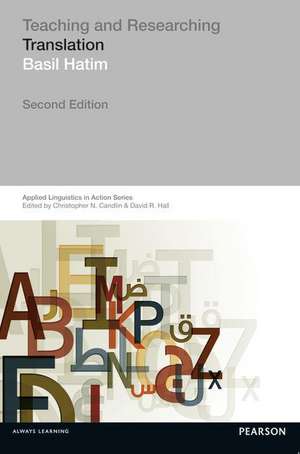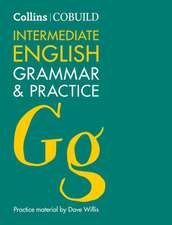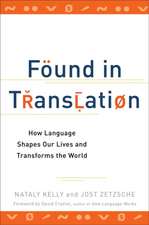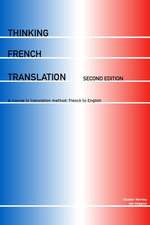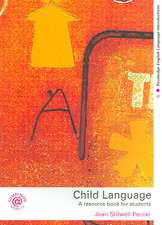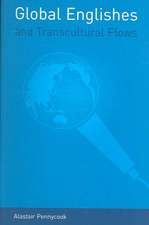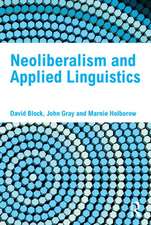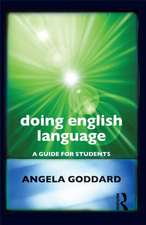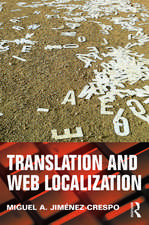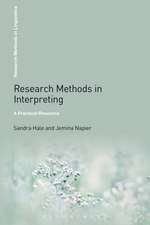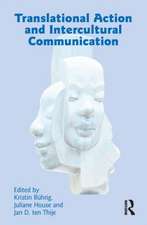Teaching and Researching Translation: Applied Linguistics in Action
Autor Basil A. Hatimen Limba Engleză Paperback – 15 noi 2012
This second edition has been fully revised and updated through-out to include:
- The most up-to-date research in a number of key areas
- A new introduction, as well as a new chapter on the translation of style which sets out a new agenda for research in this field
- Updated examples and new concepts
- Expanded references, bibliography and further reading sections, as well as new links and resources
Basil Hatim is Professor of Translation & Linguistics at the American University of Sharjah, UAE and theorist and practitioner in English/Arabic translation. He has worked and lectured widely at universities throughout the world, and has published extensively on Applied Linguistics, Text Linguistics, Translation/Interpreting and TESOL.
| Toate formatele și edițiile | Preț | Express |
|---|---|---|
| Paperback (1) | 452.35 lei 43-57 zile | |
| Taylor & Francis – 15 noi 2012 | 452.35 lei 43-57 zile | |
| Hardback (1) | 1005.80 lei 43-57 zile | |
| Taylor & Francis – feb 2016 | 1005.80 lei 43-57 zile |
Preț: 452.35 lei
Nou
Puncte Express: 679
Preț estimativ în valută:
86.58€ • 89.22$ • 73.09£
86.58€ • 89.22$ • 73.09£
Carte tipărită la comandă
Livrare economică 03-17 martie
Preluare comenzi: 021 569.72.76
Specificații
ISBN-13: 9781408297636
ISBN-10: 1408297639
Pagini: 344
Dimensiuni: 156 x 234 x 20 mm
Greutate: 0.52 kg
Ediția:Revizuită
Editura: Taylor & Francis
Colecția Routledge
Seria Applied Linguistics in Action
Locul publicării:Oxford, United Kingdom
ISBN-10: 1408297639
Pagini: 344
Dimensiuni: 156 x 234 x 20 mm
Greutate: 0.52 kg
Ediția:Revizuită
Editura: Taylor & Francis
Colecția Routledge
Seria Applied Linguistics in Action
Locul publicării:Oxford, United Kingdom
Cuprins
General Editors’ Preface
Author’s acknowledgements
About this book
Section I: Translation studies: History, basic concepts and key issues in research
1 Translation studies and applied linguistics
1.1 Applied linguistics and the translation analyst
1.2 Reflective Practice
1.3 Action research: The theory–practice cycle
1.4 Translation studies: A house of many rooms
2 From linguistic systems to cultures in contact
2.1 Formal equivalence
2.2 Bridging cultural and linguistic differences
3 Equivalence: Pragmatic and textual criteria
3.1 Opening up to pragmatics
3.2 Textuality and equivalence
3.3 Translation and relevance
4 Cultural studies and translator invisibility
4.1 Translator invisibility &nbsnbsp;
4.2 Deconstruction: The plurality of meaning
4.3 Gendered translation: Production not reproduction
5 From word to text and beyond
5.1 Translation as metatext
5.2 Translation: Shaping context and history
6 Literary and cultural constraints
6.1 Polysystem theory and translation
6.2 The Manipulationists
6.3 Translation purpose
6.4 The circle closes: Linkages to other disciplines
Section II: Research models
7 Register-oriented research models
7.1 The age of dichotomies
7.2 Skopos and translation strategy
7.3 Text reception and translation strategy
7.4 Quality assessment and translation strategy
7.5 Translation strategy dichotomies assessed
8 The pragmatics turn in research
8.1 Translation strategy and Relevance Theory
8.2 Translating the direct way
8.3 Communicative clues
8.4 The pragmatic view of translation strategy assessed
9 Focus on the text
9.1 Text processing and the process of translation
9.2 The genre–text–discourse triad
10 Translation and ideology
10.1 The ideology of vs. in translation
10.2 The ideology of translation: A feminist perspective
10.3 The North American scene
10.4 The ideology of translation: A feminist perspective
11 Translation of genre vs. translation as genre
11.1 Translation of genre
11.2 Translation as genre &nbnbsp;
12 Empirical research in translation studies
12.1 Corpus research into translation universals
12.2 Process research
13 Theory and practice in translation teaching
13.1 Translation into the foreign language
13.2 The nature of translation errors
13.3 Text typologies as a didactic instrument
Section III: Emphasis on practitioner research
14 Action and reflection in practitioner research
14.1 Textual practices and practitioner research
14.2 Researching text, discourse and genre
14.3 Text matters
14.4 Discourse matters
14.5 Genre matters
15 Setting a teaching and research agenda: the case of style translation
15.1 Literal translation: Limitations and possibilities
15.2 Style and textual dynamism
15.3 Register theory enriched
15.4 The ubiquitous nature of style
15.5 Interdiscursivity, genre and translation
15.6 Case studies
15.7 Exemplar research projects
Section IV: Links and resources
16 Resources
16.1 Links and resources
16.2 Glossary of text linguistics and translation terms
References
Index
Author’s acknowledgements
About this book
Section I: Translation studies: History, basic concepts and key issues in research
1 Translation studies and applied linguistics
1.1 Applied linguistics and the translation analyst
1.2 Reflective Practice
1.3 Action research: The theory–practice cycle
1.4 Translation studies: A house of many rooms
2 From linguistic systems to cultures in contact
2.1 Formal equivalence
2.2 Bridging cultural and linguistic differences
3 Equivalence: Pragmatic and textual criteria
3.1 Opening up to pragmatics
3.2 Textuality and equivalence
3.3 Translation and relevance
4 Cultural studies and translator invisibility
4.1 Translator invisibility &nbsnbsp;
4.2 Deconstruction: The plurality of meaning
4.3 Gendered translation: Production not reproduction
5 From word to text and beyond
5.1 Translation as metatext
5.2 Translation: Shaping context and history
6 Literary and cultural constraints
6.1 Polysystem theory and translation
6.2 The Manipulationists
6.3 Translation purpose
6.4 The circle closes: Linkages to other disciplines
Section II: Research models
7 Register-oriented research models
7.1 The age of dichotomies
7.2 Skopos and translation strategy
7.3 Text reception and translation strategy
7.4 Quality assessment and translation strategy
7.5 Translation strategy dichotomies assessed
8 The pragmatics turn in research
8.1 Translation strategy and Relevance Theory
8.2 Translating the direct way
8.3 Communicative clues
8.4 The pragmatic view of translation strategy assessed
9 Focus on the text
9.1 Text processing and the process of translation
9.2 The genre–text–discourse triad
10 Translation and ideology
10.1 The ideology of vs. in translation
10.2 The ideology of translation: A feminist perspective
10.3 The North American scene
10.4 The ideology of translation: A feminist perspective
11 Translation of genre vs. translation as genre
11.1 Translation of genre
11.2 Translation as genre &nbnbsp;
12 Empirical research in translation studies
12.1 Corpus research into translation universals
12.2 Process research
13 Theory and practice in translation teaching
13.1 Translation into the foreign language
13.2 The nature of translation errors
13.3 Text typologies as a didactic instrument
Section III: Emphasis on practitioner research
14 Action and reflection in practitioner research
14.1 Textual practices and practitioner research
14.2 Researching text, discourse and genre
14.3 Text matters
14.4 Discourse matters
14.5 Genre matters
15 Setting a teaching and research agenda: the case of style translation
15.1 Literal translation: Limitations and possibilities
15.2 Style and textual dynamism
15.3 Register theory enriched
15.4 The ubiquitous nature of style
15.5 Interdiscursivity, genre and translation
15.6 Case studies
15.7 Exemplar research projects
Section IV: Links and resources
16 Resources
16.1 Links and resources
16.2 Glossary of text linguistics and translation terms
References
Index
Descriere
Teaching & Researching Translation provides an authoritative and critical account of the main ideas and concepts, competing issues, and solved and unsolved questions involved in Translation Studies. This book provides an up-to-date, accessible account of the field, focusing on the main challenges encountered by translation practitioners and researchers. Basil Hatim also provides readers and users with the tools they need to carry out their own practice-related research in this burgeoning new field.
